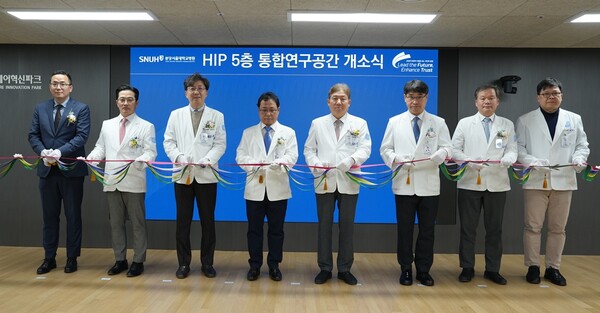Seoul National University Bundang Hospital (SNUBH)’s Biomedical Research Institute aims to establish itself as a hub for research and development in advanced biopharmaceuticals, including regenerative medicine and gene therapy.
To achieve this goal, the institute has established the "Integrated Research Space," a cutting-edge platform for innovation.

Seoul National University Bundang Hospital Biomedical Research Institute has established an innovative research platform for developing advanced biopharmaceuticals, such as regenerative medicine and gene therapy, by building an Integrated Research Space. (Courtesy of Seoul National University Bundang Hospital)
On Monday, the hospital held an opening ceremony for the Integrated Research Space on the fifth floor of the Healthcare Innovation Park and presented a blueprint for such medical innovation at a symposium.
The Integrated Research Space is designed as a comprehensive platform for developing advanced biopharmaceuticals, including advanced regenerative medicine, organoids, and gene therapy.
The hospital said it provides an optimal research environment that promotes collaboration among researchers and supports rapid industrialization of experimental results by building an environment that encompasses the entire cycle of drug development from early research to clinical application.
At the opening ceremony, Dr. Song Jung-han, president of Seoul National University Bundang Hospital, Dr. Lee Hak-jong, director of the Biomedical Research Institute, and other hospital officials and leading figures from the bio-industry and academia shared the vision and significance of the new research space.
“Advanced regenerative and future medicine are innovative fields that redefine conventional treatments,” SNUBH President Song said. “This Integrated Research Space is an important milestone in realizing our vision of future medical care.”
Director Lee noted that, like the Organoid Bank, the state-of-the-art research platform will support the development of innovative therapies and clinical research and create an optimal environment for multidisciplinary research collaboration.
“This is where researchers can collaborate to produce results that translate into clinical practice and become a world-class research center,” Lee said.
The symposium featured in-depth discussions on advanced regenerative medicine clinical research and developing innovative therapeutics using organoids. Organized by the Center for Regenerative Medicine, the online and offline event provided a significant opportunity for researchers to share the latest research trends and strengthen collaboration.
Seoul National University Bundang Hospital said these events presented a clear vision of the hospital as a leader in the development of advanced biopharmaceuticals.
“We hope the new research space and symposium will foster collaboration and lead to breakthroughs that bring hope to many patients,” Song said.